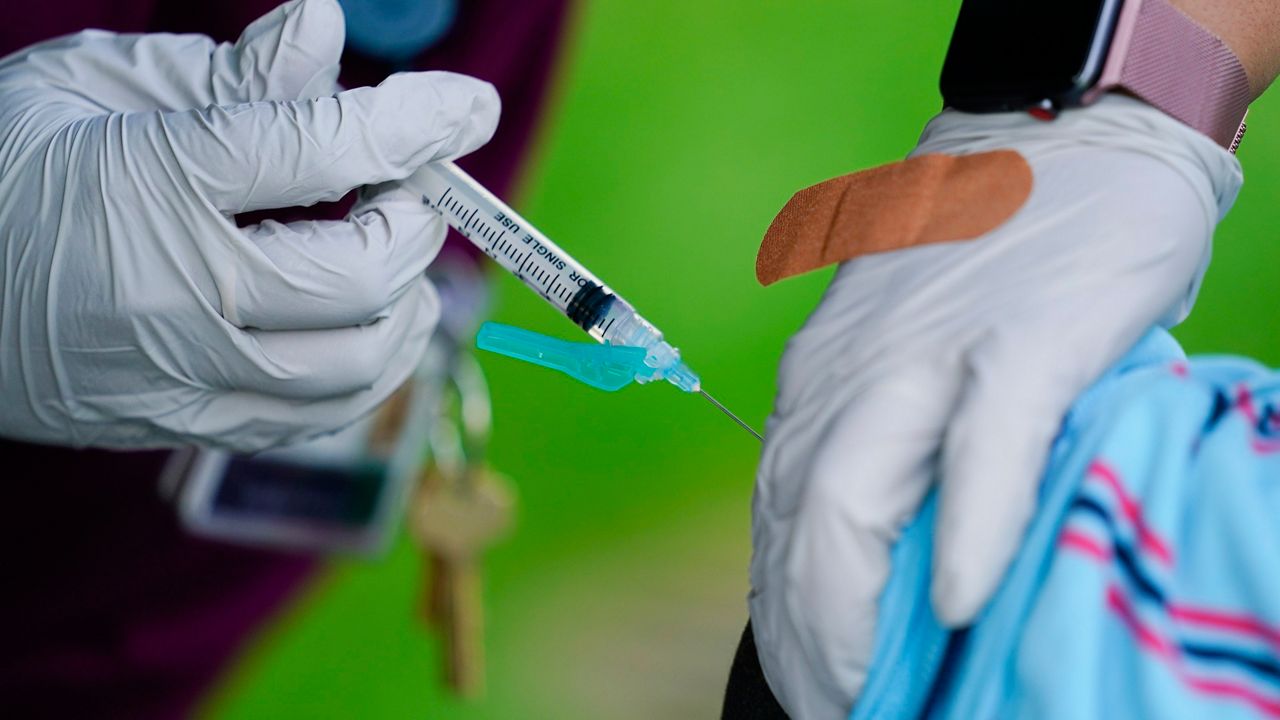Children 5 to 11 years old could start getting Pfizer’s coronavirus vaccine in the coming weeks.
Federal officials and the North Carolina Department of Health and Human Services are getting ready to roll out the shot, likely in early November.
Kids 12 and older can already get the Pfizer shots.
Here’s what we know so far about getting younger kids vaccinated:
The dosage for 5- to 11-year-olds will be a third of what adults and kids 12 and up have been getting. The needles will also be smaller. Children will still have to get two doses over the course of several weeks to be fully vaccinated against COVID-19.
Duke University was part of the studies to figure out the best dosage for younger children.
“In pediatrics, we know that kids are not little adults,” Duke pediatrician Michael Smith said in a recent interview. “Our 10- and 11-year-olds who got the 30-microgram dose of Pfizer, which is the same dose that adults get, they had some pretty significant reactions.”
He said those reactions included high fevers and pain.
“Ten micrograms in the 5- to 11-year-olds leads to the same exact immune response as older kids and adults getting 30 micrograms,” Smith said.
“Vaccine is really good at preventing disease. It’s really, really good at preventing severe disease,” he said.
The Biden administration and officials from the North Carolina DHHS are preparing for the vaccines to be approved for children 5 to 11 in early November.
There are a couple of steps federal regulators need to go through before younger children can start getting the vaccine.
An independent Food and Drug Administration advisory committee is set to meet and discuss the vaccines Oct. 26. After that, an independent committee with the Centers for Disease Control and Prevention will meet to make its recommendation on the vaccine Nov. 2 and 3.
“We will be ready to begin getting shots in arms in the days following a final CDC recommendation,” the Biden administration said Wednesday.
In a memo to vaccine providers, N.C. DHHS said it expects to start shipping out doses to doctors, hospitals and pharmacies after the Oct. 26 FDA meeting. But they can’t start giving the shots until final approval from the CDC.
“We want kids in North Carolina receiving vaccine on day one of eligibility,” N.C. DHHS said in the letter.
North Carolina public health officials are still lining up all the sites that will receive the Pfizer vaccine for 5- to 11-year-olds. But federal officials say they will be targeting smaller providers like doctor’s offices and pharmacies to get the shots out.
“Pediatricians, and other doctors, are some of the most trusted sources for families when it comes to COVID-19 vaccines for children. These providers will play a critical role in the nationwide effort to get children vaccinated,” the Biden administration said.
Federal officials say they plan to send vaccine doses to 25,000 pediatricians across the country, along with children’s hospitals, pharmacies, school-based clinics and community health providers.
In North Carolina, DHHS said, “We are working with pediatricians, local health departments, pharmacies and other vaccine providers so they can be operationally ready to administer vaccine as quickly as possible when and if vaccines for younger children are authorized and recommended.”
The best way to find a vaccine provider in North Carolina is on DHHS’s MySpot.nc.gov or to call 888-675-4567.
The Biden administration said Wednesday that the country has supplies to get younger kids vaccinated.
“The administration has procured enough vaccine to support vaccination for the country’s 28 million children ages 5 to 11 years old,” the White House said in a statement.
Pfizer will be sending out the vaccine doses in smaller packages so public health officials can be more flexible in sending doses to doctors and pharmacies that may not be vaccinating thousands of children.
“The federal government has indicated they will have sufficient supply to meet the need to be administered over several weeks,” North Carolina public health officials said.
“In preparation for potential authorization, the Federal government has made initial allocations to states of the pediatric vaccine doses based on population, and NCDHHS has worked to ensure that product will be available across our state equitably,” the department said.
Daily COVID-19 case counts continue to drop in North Carolina, but that doesn’t mean schools can let their guard down yet.
“We’re going to encourage, and I personally encourage, districts to continue requiring masks, at least until you have high proportions of your students and faculty vaccinated,” Duke pediatrician Michael Smith said.
Smith is part of the ABC Science Collaborative, which has been researching how to keep kids safe and in school.
He said schools have two main things to consider when they start thinking about loosening mask rules in the classroom.
“What proportion of your students and staff are vaccinated? The closer you get to 100%, you know 100% is the real goal, the closest you can get to that to that number, the much more comfortable I’d be to remove a mask mandate,” he said.
The second thing is to look at case numbers and positivity rates in the community.
“The vaccine level is the most important thing that we can control,” he said. “Once we can get some of our younger kids vaccinated, I think we’re going to be better positioned for the next wave.”



